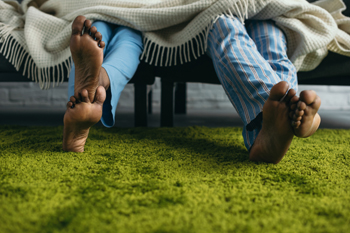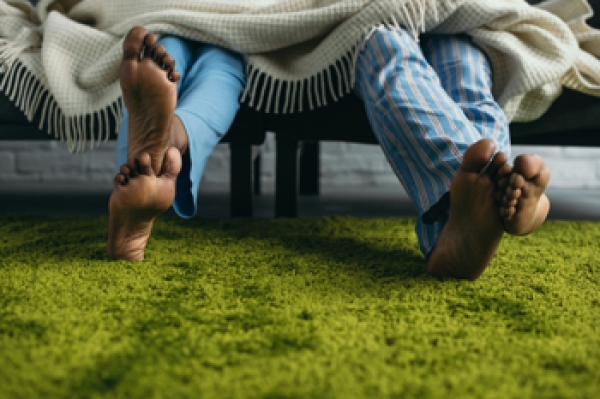 Did you know that 60% of falls happen in the home? Preventing these falls is always important, but should become even more of a priority as we age. The older we get the more dangerous falls become. Potential complications from falls can include sprains, broken bones, and in severe cases even traumatic brain injuries. Fortunately, there are things you can do to decrease your risk of falling. If you live in a home with steps or stairs, make sure that the stairs have tightly fastened handrails that you can grip as you walk up and down. Throughout your home, ensure that carpets and rugs are firmly fixed to the floor. In bathrooms, place non-skid mats on surfaces that may get wet. Make sure that your home is well-lit and that tripping hazards, such as electrical cords and small furniture, are kept away from walking areas. Beyond home safety issues, another common cause of falls is compromised foot health. Pain in the feet and ankles, poor circulation, gait abnormalities, and improper footwear could all increase your risk of falling. For more advice and to help reduce your risk, speak with a podiatrist today.
Did you know that 60% of falls happen in the home? Preventing these falls is always important, but should become even more of a priority as we age. The older we get the more dangerous falls become. Potential complications from falls can include sprains, broken bones, and in severe cases even traumatic brain injuries. Fortunately, there are things you can do to decrease your risk of falling. If you live in a home with steps or stairs, make sure that the stairs have tightly fastened handrails that you can grip as you walk up and down. Throughout your home, ensure that carpets and rugs are firmly fixed to the floor. In bathrooms, place non-skid mats on surfaces that may get wet. Make sure that your home is well-lit and that tripping hazards, such as electrical cords and small furniture, are kept away from walking areas. Beyond home safety issues, another common cause of falls is compromised foot health. Pain in the feet and ankles, poor circulation, gait abnormalities, and improper footwear could all increase your risk of falling. For more advice and to help reduce your risk, speak with a podiatrist today.
Preventing falls among the elderly is very important. If you are older and have fallen or fear that you are prone to falling, consult with Dr. Joshua David Scoll from Pennsylvania. Our doctor will assess your condition and provide you with quality advice and care.
Every 11 seconds, an elderly American is being treated in an emergency room for a fall related injury. Falls are the leading cause of head and hip injuries for those 65 and older. Due to decreases in strength, balance, senses, and lack of awareness, elderly persons are very susceptible to falling. Thankfully, there are a number of things older persons can do to prevent falls.
How to Prevent Falls
Some effective methods that older persons can do to prevent falls include:
- Enrolling in strength and balance exercise program to increase balance and strength
- Periodically having your sight and hearing checked
- Discuss any medications you have with a doctor to see if it increases the risk of falling
- Clearing the house of falling hazards and installing devices like grab bars and railings
- Utilizing a walker or cane
- Wearing shoes that provide good support and cushioning
- Talking to family members about falling and increasing awareness
Falling can be a traumatic and embarrassing experience for elderly persons; this can make them less willing to leave the house, and less willing to talk to someone about their fears of falling. Doing such things, however, will increase the likelihood of tripping or losing one’s balance. Knowing the causes of falling and how to prevent them is the best way to mitigate the risk of serious injury.
If you have any questions, please feel free to contact one of our offices located in Philadelphia, Bensalem, and Fairless Hills, PA . We offer the newest diagnostic and treatment technologies for all your foot care needs.

